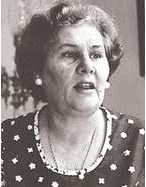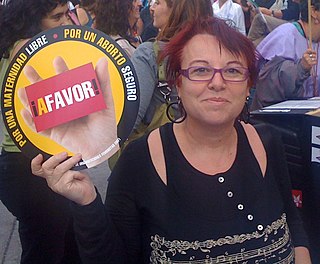This article relies largely or entirely on a single source .(February 2021) |

Line Bareiro (born 1950) is a Paraguayan political scientist, civil rights activist and feminist. [1]
This article relies largely or entirely on a single source .(February 2021) |

Line Bareiro (born 1950) is a Paraguayan political scientist, civil rights activist and feminist. [1]
Line Bareiro studied at the University of Heidelberg in Germany, gaining a Masters in political science in 1979 and working as a research assistant to Dieter Nohlen. Returning to Paraguay she worked with the NGO Paraguayo de Datos (BPD) until its suppression by Alfredo Stroessner in 1982. She was a founder member of the Centro de Documentación e Estudios in 1985, and active in the women's movement Coordinación de Mujeres del Paraguay (CMP), founded in 1987. After Stroessner's overthrow in 1989, she was a founder member of Decidamos, a citizen advocacy group of NGOs. [1]
In 2010 Bareiro was elected to the UN's Committee on the Elimination of Discrimination against Women (CEDAW), to serve on the committee from 2011 until 2014. [1]

Eliza Alice Lynch was an Irish woman, the mistress-wife of Francisco Solano López, president of Paraguay.

Mecha Ortiz was a classic Argentine actress who appeared in film between 1937 and 1981, during the Golden Age of Argentine Cinema. At the 1944 Argentine Film Critics Association Awards, Ortiz won the Silver Condor Award for Best Actress for her performance in Safo, historia de una pasión (1943) and won it again in 1946 for her performance in El canto del cisne (1945). She was known as the Argentine Greta Garbo and for playing mysterious characters, who suffered by past misfortunes in love, mental disorders, or forbidden love. Safo, historia de una pasión was the first erotic Argentine film, though there was no nudity. She also played in the first film in which a woman struck a man and the first film with a lesbian romance. In 1981, she was awarded the Grand Prize for actresses from the National Endowment for the Arts.
Sendero ('Path') was a Spanish-language newspaper in Paraguay, published by the Paraguayan Episcopal Conference (CEP). Initially it was a fortnightly and was later converted into a weekly newspaper.
Feminism in Argentina is a set of movements aimed at defining, establishing, and defending equal political, economic, and social rights and equal opportunities for women in Argentina. Although some women have been considered precursors—among them Juana Manso and Juana Manuela Gorriti—feminism was introduced to the country as a result of the great European immigration wave that took place in the late 19th and early 20th century. The first feminists did not form a unified movement, but included anarchist and socialist activists, who incorporated women's issues into their revolutionary program, and prestigious freethinker women, who initially fought for access to higher education and, later, legal equality with men. Despite the efforts of the first-wave feminists, Argentine women did not acquire the right to vote until 1947, during Juan Perón's first government. His highly popular wife, Eva, championed women's suffrage and founded and ran the nation's first large-scale female political party, the Female Peronist Party. Although she refused to identify herself as a feminist, Eva Perón is valued for having redefined the role of women in politics.
Mercedes Sandoval de Hempel was a Paraguayan lawyer and feminist. She was one of the leading proponents of women's suffrage in the country, drafting the Anteproyecto de Ley de Reforma Parcial del Código Civil. In 1992, the amendment of the Paraguayan Civil Code finally recognized equality between men and women. The wording of Article 1 of Law 704/61 was simple: “Reconócese a la mujer los mismos derechos y obligaciones políticos que al hombre.”
Gladys Ethel Parentelli Manzino is a Uruguayan feminist theologian and photographer who has lived in Venezuela since 1969. A representative of Latin American ecofeminism, she was one of three Latin American women appointed by Pope Paul VI as observers at the Second Vatican Council.

Carmen Casco de Lara Castro was a Paraguayan teacher, women's and human rights advocate and a politician. She established one of the first independent human rights organizations in Latin America and fought for both women's equality and an end to state-sponsored terrorism under the dictatorship of Alfredo Stroessner. She was influential in passing legislation for pay equity and maternity rights, as well as securing the repeal of laws curtailing basic human rights.

Mario Abdo Benítez, nicknamed "Marito", is a Paraguayan politician who is the current President of Paraguay. He was previously a senator and President of the Senate.
Paraguayan Communist Party (independent) (in Spanish: Partido Comunista Paraguayo is a communist political party in Paraguay. PCP was founded in 1967 as a split from the Paraguayan Communist Party. Since the defeat of the guerrilla groups led by the party in 1963, opposition to Creydt in the PCP had grown. He was first criticised for his authoritarian behaviour and later for his anti-Cuban and pro-Chinese positions. He was deposed as secretary general in August 1965 and excluded from the party in 1967. His party faction first kept the same name as the pro-soviet faction but since 1973 “independent” was added to the party name. Many of the activities of the PCP were directed against the PCP. The party was subjected to harsh repression by the regime of Alfredo Stroessner. It publishes “Unidad Paraguaya”. When Creydt died in 1987 the party was very weak. When Stroessner fell in 1989 the party stayed in a semi-clandestinity.
Clara Obligado Marcó del Pont is an Argentine-Spanish writer.

Montserrat Boix Piqué is a Spanish journalist, considered among the most influential women in her country. In early 2000, she created and developed the concepts of social cyberfeminism, and a year later those of feminist hacktivism. Another of her main areas of work is gender violence and communication. She has also stood out as a defender of the right to communication and citizenship rights for women. Since 1986, she has been a journalist for the Information Services of Televisión Española (TVE), in the international section.
Leonor Cecotto was a 20th-century Latin American painter and engraver. Born in Argentina, she resided in Paraguay for the majority of her life, eventually becoming a prominent artist in the latter country. She was known for both her paintings and her xylographs.

The Marzo paraguayo was a political crisis that occurred in Paraguay because of the assassination of the then-Vice President Luis María Argaña on 23 March 1999. The opposition blamed the then-President, Raúl Cubas Grau, and also the strongman of Paraguayan politics of that time, Lino Oviedo, for the assassination. Argaña's assassination provoked a series of demonstrations by opponents and supporters to Oviedo and the Cubas government, which culminated in clashes in which seven demonstrators opposed to the government died, which resulted in the resignation of Cubas from the presidency.
Margarita Morselli is an artist who is considered a pioneer in the use of a video as a form of artistic expression in Paraguay. The work she presented was on abstraction with references to real spaces.

Rosa Cobo Bedía is a Spanish feminist, writer, and professor of sociology of gender at the University of A Coruña. She is also the director of the Center for Gender Studies and Feminists at the same university. Her main line of research is feminist theory and the sociology of gender.

Carmen Sarmiento is a Spanish journalist and television presenter specializing in international and social issues especially relating to feminism and disadvantaged women. She was a pioneering woman in war journalism.
Rubén Bareiro Saguier was a Paraguayan writer, poet and diplomat.

Myriam Sienra was a Paraguayan actress and journalist who graduated from the Silvio D’Amico Academy of Dramatic Arts in Rome.
Isabel Arrúa Vallejo or Vallejos (1913/1914-2006) was a Paraguayan teacher, diplomat and feminist. She was Paraguay's first woman with diplomatic rank, as attaché of the Embassy of Paraguay to Brazil from 1945 to 1948.
Clyde Soto Badaui is a Paraguayan feminist, psychologist and human rights activist.